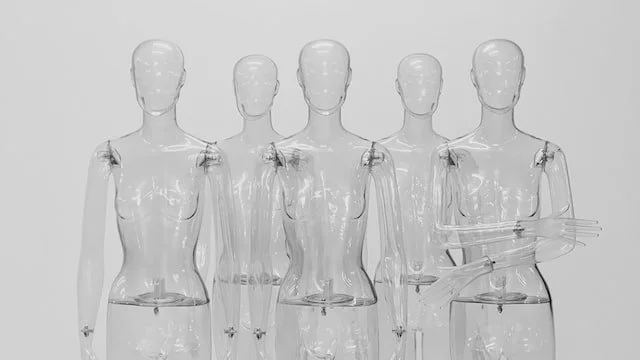Gospel Hope for Self-Haters: David Powlison with a layered analysis of something many struggle with. “He is actually saying something that competes with the false voices, and it is not just something you rehearse in your own head. He’s actually inviting you to come out of yourself, out of the death spiral, the vortex of self-hatred, as we are talking about it right now.”
Men and Emotions: I’ve spent a lot of time working with men on this issue (and myself!) and love Joseph Hussung’s approach. He explains, “The purpose of using these tools is simple. We need to be able to express our emotions. We need to be able to express them to our Lord, and we need to be able to express them to others.”
What’s Beneath it all? Sylvia Schroeder considers her cries to God for her daughter’s life, “Were my begging pleas like the Israelites in the Old Testament in their whining complaints? Did my request resemble theirs when they craved meat and disdained manna in the wilderness? Did He grow tired of my pleas?”
Banksy and Beauty from Ashes: Tim Challies with a reflection on a graffiti artist’s statement, “Not too long ago, I read that the mysterious artist Banksy had created several new murals in Ukraine. Going to locations that had experienced the fury of war, he found broken and damaged buildings and used them as his canvas.”
Four Reasons to Be Early to the Sunday Gathering: I appreciate Jacob Crouch’s simple admonitions to church-goers here, “Try showing up just 10 minutes early next week. This isn’t a law from on high, but I really think this could be a prudent way to make the most of a Sunday morning.”
The Plumb Line
Who is the person you compare yourself to most often? Perhaps it is a family member, friend, or co-worker; perhaps it is even a celebrity. We humans are comparison machines. We’re constantly evaluating the stimuli around us. Social media has exacerbated the issue, giving us instant access into the highlight reels of thousands of friends and celebrities. Psychology Today reports that, “According to some studies, as much as 10 percent of our thoughts involve comparisons of some kind.” Friend, this kind of toxic comparison is harmful.
This Week's Recommendations
11 Statistical Tips for a Healthy Marriage: Aaron Earls considers how much the research supports biblical wisdom for marriage. For instance, “Research finds couples are 31 percent less likely to get divorced if they have some pre-marriage training.”
5 Myths About Porn: Ray Ortlund debunks five lies. For instance, “Porn has no lasting impact. You can stop at any time. You are in control. The myth says, “You can even budget your porn use. Hold back during those times when you need to be at your best for Christ or for your family or whatever. But then, after you’ve been good for a while, you can jump back in—no problem.” Really? Sin is that easy, and our freedom is that negotiable?”
God’s View of Gender Dysphoria and the Transgender Movement: Eric Geiger begins, “Imagine being a teenager who doesn’t feel at home in your own body. You never felt you met the typical gender stereotypes of guys playing with trucks and rough sports and girls dressing up and play with dolls. You aren’t happy, and you so badly want to be happy. Like all teenagers through all generations, you want a sense of identity, of who you are. You would love to be known for something, to be celebrated. You watch lots of Tik-Tok videos about others who have changed their gender identity, and they recount stories of being celebrated and affirmed for their courage.”
The Great Deception: Kristin begins, “I have been told that my first sentence was this: I do it.”
Consider Suffering Joy? Robby Lashua asks, “What good might God be using suffering for?
This Week's Recommendations
7 Lessons I’ve Carried From ‘Narnia’: Kaitlin Miller begins with this lesson, “Grief is Great: In The Magician’s Nephew, Digory, in deep despair over his mother’s illness, is shocked when the great Lion bends down with such great shining tears that Digory felt the Lion may have been even more sorrowful.”
Can You Share the Gospel with Sexual Sinners Without Sounding Like a Bigot? Alen Shlemon shares, “Part of the reason for expecting people to get upset by your convictions on sexual matters is that people closely connect their identity with their sexuality.”
The Many Odd Uses and Abuses of Matthew 18: Keith Evans explains what Jesus’s important passage on confronting the sins of your brother means and doesn’t mean. For instance, “Jesus addresses public persons publicly. Recall his scathing condemnation of Herod (Luke 13:32), or his many public “woes” (i.e. “curses”) pronounced upon the pharisees (cf. Matt 23:13-39). We can almost hear the modern Christian retort: ‘Yes, Jesus, but did you confront all of them privately first?!’”
When Self-Care Becomes Self-Absorption: Trevin Wax helps provide some perspective here on where generations can swing too far in either direction. He begins, “I saw a funny video recently that joked about the generational shift in how we view practices of self-care and therapy. In the old days: ‘You’re in therapy? What’s wrong with you?’ Today: ‘You’re not in therapy? What’s wrong with you?’”
Painters who aren’t parents vs. painters who actually have kids: Ha!
What is Good (and Bad) about Transparency
The rise of reality TV and then social media has radically increased transparency. Team Transparency has rallied around #nofilter selfies and sharing even the frustrating and discouraging parts of life. Team Self-Respect has rallied around calls for decency and the need for some last bastion of privacy. Team Transparency has attacked Team Self-Respect for their filtered and prettied-up lives, for mushy posts about significant others, and for bragging about their kids. Team Self-Respect has attacked Team Transparency for their self-importance and oversharing about bad bosses and relationships, and shaming their spouses and children.
So, which team is right? Should we be transparent?
Can I Change?
Can you change in 2023? Yes, yes, you can! And that change begins not by never giving up on you, but by never giving up on God. He has made you for something far bigger and far more satisfying than what the world offers. And he promises that when you give up on yourself, you will change….May 2023 be the year we behold his face. Are you willing to give to God your plans, hopes, dreams, and desires to experience his transformation? The reward is worth the price.
To My Freshman Self
Hi high school freshman me! It is future college freshman you, writing to encourage you in hard truths that you're going to wrestle with over the next four years.
As I begin college, I am borderline-overwhelmed with the repercussions and magnitude of my sin patterns. On many occasions I have found myself giving in to my urge to please people, adapting who I am to a “better” version of myself so that people can only see the side of me that best fits my surrounding environment. I have found myself tempering my boldness. I have suppressed my passion, my ambition, and most of all, my relationship with Christ.
This Week's Recommendations
Love One Another: Local leader and life advocate Matt Merrill writes, “My encouragement for this moment is to consider not perpetuating the sin of devaluing the life of the person who is arguing contrary.”
Did Jesus Tell us to Give to Every Panhandler: John Piper handles this question with appropriate nuance. “Here’s a daily scenario. You’re sitting in your car at a stoplight. Someone approaches your window to ask for money or food. You sit facing forward, ignoring them to focus on the traffic light ahead, until you finally drive off. Every time I do this, something doesn’t feel right here, especially with regards to Luke 6:30 — we should give to everyone who asks.”
I am Just Tired! Sacha Alexandre Mendes unpacks a seemingly mundane topic with great depth, “In your life and ministry experience, you will face weariness. Therefore, it is vital to develop a biblical understanding of tiredness, its scope, and its impact on your life and ministry.”
5 New Stats You Should Know about Teens and Social Media: Chris Martin shares some enlightening information. For instance, “It’s not hyperbolic to say that YouTube is the most influential—and, therefore, the most important—website in the world. It’s used by almost every single teen in the country, and as of Pew’s latest research of U.S. adults in 2021, it’s also used by 81 percent of all adults. YouTube is king of the social media world…”
The Bible Tells Us the Rest of the Story About Who We Are: David Mobley shares a Francis Schaeffer analogy: “Now, imagine having that set of page fragments, and then finding the remaining portion of all of the pages from the book somewhere, perhaps in the attic. By taking the newly discovered set of page fragments and placing them together with the pages you already have, you would be able to complete the book. It would be easy to tell that the remaining portions match the fragments, because taken together they complete the story. And once the story is completed, you could read the whole story and finally make sense of the whole book.”
This Week's Recommendations
The Thing About ‘Light and Momentary’: I found Tim Challies’s reflections on suffering to be very helpful. He begins, “They are words that can be tremendously encouraging or tremendously discouraging. Said at the wrong time or in the wrong spirit they can compound hurt, but said at the right time and in the right spirit they can be a cool drink on a hot day, a soothing balm on a sore wound.”
The Church’s Role in Making Abortion Unthinkable and Unnecessary: Jen Oshman shares, “Studies show that for women who have an abortion, their suicidality increases by 155 percent. Studies also show that about 80 percent of women would not have chosen abortion if they had felt more supported. So my call to the church, then, is How can we seek life? How can we come alongside vulnerable women, vulnerable children, vulnerable families, and how can we be people who help them seek life? How can we be a culture that makes abortion not only unthinkable, but unnecessary—just something that’s not even on the agenda because we are a church and a people in a community that comes around the vulnerable population?”
Killing Goliath: My friend and fellow pastor at New Life, Dustin DeJong, helps adjust the way we read a familiar story. “We assume we’re David but we aren’t. You aren’t David and Goliath isn’t some problem to be solved.”
My Reconstructed Faith: Philip Ryan says, “Over the past two years, we have all seen and listened to many stories of deconstruction from authors, musicians, and even YouTube personalities. Sadly, these stories are celebrated even by some Christians — the same Christians who then mock those who raised alarm over deconstruction. What I don’t often hear are stories of those who have reconstructed their faith.”
A Nobody in One Country, Famous in the Next: Darryl Dash with a real story that relates profoundly to us: “Sixto Rodriguez was a nobody. He’d tried to establish a career as a musician, but it went nowhere. He showed lots of promise and had sold a handful of records, but his record label dropped him and then closed. He was working on a third album at the time, but it was never released.”














